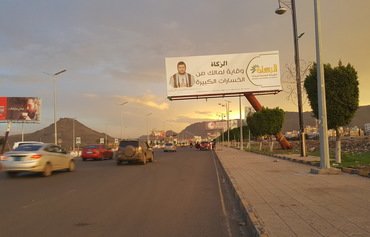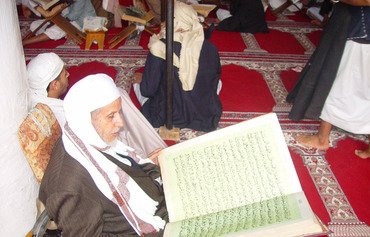By issuing a unilateral decree establishing a General Authority for Zakat and attempting to change the law of the land via another channel, the Houthis (Ansarallah) are seeking to gain control of zakat funds in Yemen, experts said.
Houthi political council president Mahdi al-Mashat issued a decree on May 14th establishing the General Authority for Zakat.
At the same time the Iran-backed militia has introduced -- through lawmakers loyal to it in the Yemeni parliament, which is now largely under its control -- an amendment to an article in the country's zakat law.
With this amendment, which parliament has yet to approve, the Houthis are seeking to divert 20% of zakat funds to the group and its leadership under the guise of "khums", MP Ahmed Seif Hashed said in a social media post.
Khums is an obligation for Shia Muslims, who are required to pay one fifth of what remains of their annual income after their expenses are deducted, in addition to regular zakat.
Misuse of state funds
"The Houthis are stealing our money in broad daylight," said accountant Abdul Aziz al-Absi, expressing resentment over the militia's misuse of state funds, particularly zakat funds.
"They were not satisfied with state revenues in the areas under their control," he said, adding that in addition to withholding the salaries of state employees, they are now going after money meant for the poor.
The Houthis established the General Authority for Zakat without the required approval of parliament, al-Absi said, adding that "these actions show contempt for the intelligence of the public".
Minister of Social Affairs and Labour Ibtihaj al-Kamal, who also serves as deputy chairwoman of the Higher Committee for Relief, denounced the Houthis' decision to establish a General Authority for Zakat.
It is an "obvious attempt to abolish the Social Welfare Fund and disrupt the work of the fund in the provinces controlled by the militia", she said in a June 1st statement carried in local media.
"This illegal measure is a frightening development in the context of the militia’s effort to find new pretexts to collect money and use it in its absurd war against Yemenis," she said, adding that it serves as "additional burden on residents".
Collection of money
The Houthis "know nothing other than to collect money, and are seeking to go after the zakat money by forcing parliament to approve the khums", political analyst Munir Talal told Al-Mashareq.
"The Houthis are raking in a lot of money from the taxes they are imposing by force, and which exceed the amount of zakat," he said.
The militia controls all state resources in the areas it controls, including zakat revenue, political writer and activist Faisal al-Safwani told Al-Mashareq.
"Amending the law and establishing the [zakat] authority means more levies will be imposed on the public and zakat will be separated from duties so they [the Houthis] can get the khums," he said.
The Houthis aim with these moves to "impose a three-pronged levy collection system through zakat, the khums and taxes," al-Safwani said.
The Local Authority Law grants district and provincial local councils about 48% of zakat revenue, and the decision issued by the new authority violates this law that is in force, he added.

![Yemeni women and children wait as food is distributed during Ramadan in the embattled province of al-Hodeidah on May 30th. [Abdo Hyder/AFP]](/cnmi_am/images/2018/06/06/12941-Yemen-Hodeida-food-600_384.jpg)







You truth-twister, I ask those who control oil, gas and employees’ salaries in the so-called legitimate government to be just and fair.
Reply1 Comment(s)